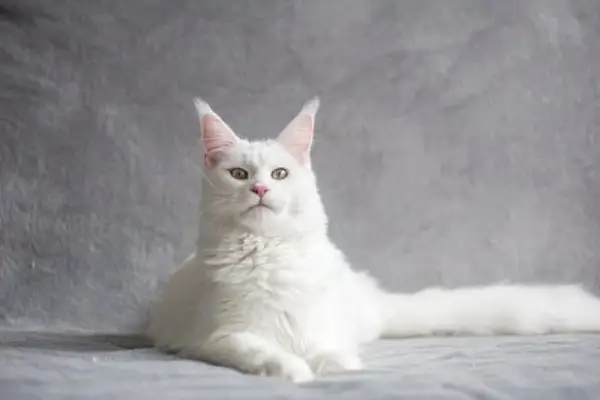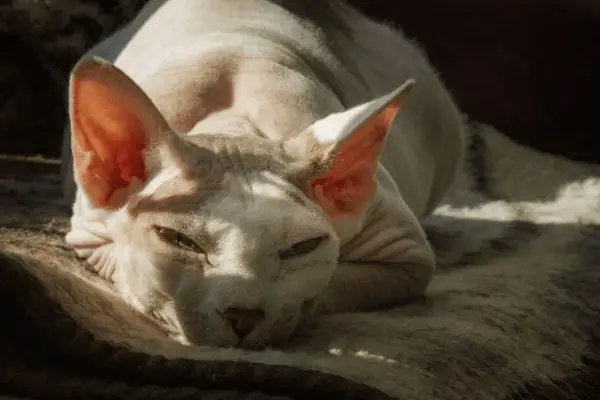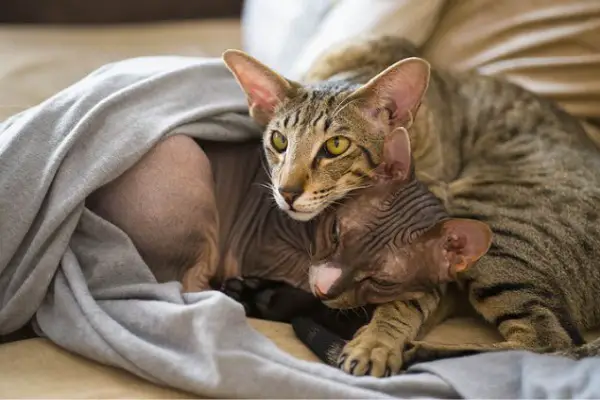12 Bengal Cat Behavior Problems & Helpful Tips

Bengal cats are beloved for their stunning looks, playful personalities, and intelligence.
However, like any breed, they can be prone to certain behavior problems.
From aggression to destructive habits, these issues can be frustrating for owners to deal with.
But don’t worry – in this short post, we’ll explore some common Bengal cat behavior problems and share tips for how to address them.
Bengal Cat Behavior Problems
Here are some of the most common Bengal cat behavior problems and ways to address them.
Bengal Cats Have A Proclivity For Depression
Bengal cats are known to be extremely energetic, active, and spirited. They love to always be kept busy.
Depressions in most Bengal cats arise due to separation anxiety, loneliness, or constant change of routine.
If depression in Bengals is not controlled or solved, it will lead to unnecessary aggressiveness towards other members of the family.
A depressed Bengal cat can run away on any small opportunity and become a feral cat, or resolve to bite and nip.
The solution to depression in Bengals
Here is how to help a depressed Bengal cat which is as follows:
- Initiate a mental stimulation exercise like puzzle games.
- Provide treats and high-scent food.
- Provide new and interactive toys like the electronic fish.
- Take your Bengal cat for an evening walk.
- Provide an artificial swimming pool for your Bengal cat.
- Make extra time to play with your Bengal cat.
- Create a very good view of the outside world through a clear window.
- Get a new cat tree or shelves.
Bengal Cats Can Be Overly Vocal At Times.
Bengal cats are known to be active cats that want to please their owners, and they have lots of needs.
Bengal cats do not stop being vocal when they are hungry or need to go outside or use their litter boxes.
They are also very vocal when you leave them alone for too long and unattended.
Bengals are more vocal when in need, so try to provide all their basic needs. There are a lot of things that scare cats, which can make them vocal.
Solution
When you leave them alone for an extended period of time, they become very noisy.
Remove everything that can cause them to become overly talkative, such as skipping meals and leaving them unsupervised at any time.
Bengal Cats Love To Scratch Furniture When Bored
When Bengal Cats are bored, they like to scratch the furniture.
Carpets and furniture are typical targets, but your Bengal cat is likely to be interested in practically any soft surface.
Scratching and biting is a problem that affects many cats, not just Bengals.
It stems from a combination of drug side effects, separation anxiety, sadness, and loneliness. Perhaps you didn’t offer suitable scratching posts.
Solution
Provide a sturdy scratching post as well as a second pet.
Scratching-safe surfaces such as cat trees, scratching pads, and other scratching-safe surfaces will help your Bengal find a more acceptable scratching object.
It would be preferable if you continued to focus on claw training and educating your Bengal cat not to scratch your furnishings.
With the Bengal cats, a little time spent teaching goes a long way, and the sooner you start training them away from destructive scratching, the better.
Bengal Cats Prefer To Avoid Litter Boxes When Bored or Sick
When bored or sick, Bengal cats prefer to avoid litter boxes.
It’s most prevalent when you first bring your Bengal cat home, and it could indicate that there aren’t enough litter boxes in their new house, or that they’d like a cleaner litter box.
Even if they haven’t exhibited any signs of litter box issues before, Bengals can develop this behavior when they bring a new family member home.
One cause of frequent litter box difficulties could be anxiety or a lack of comfort in your Bengal’s environment
Solution
If your cat starts avoiding the litter box for no apparent reason, a medical condition should be explored.
To rule out medical causes, a veterinarian visit should be scheduled.
You should also supply your Bengal cat with multiple litter boxes.
Bengal Cats Are Prone To Separation Anxiety
Yes, Bengal cats are known to be more prone to separation anxiety than other cat breeds.
This is because they are highly social and form strong bonds with their human families.
If left alone for extended periods of time, they can become anxious and exhibit behaviors such as excessive meowing, destructive behavior, and aggression.
It’s important to provide Bengals with plenty of attention and interactive playtime to prevent them from developing separation anxiety.
Solution
Separation anxiety can be a difficult condition for Bengal cats to overcome, especially if everyone in the household is required to work long hours.
You may give them more toys to keep them occupied while you’re gone.
Getting a second Bengal cat or dog is the greatest solution to address a Bengal cat’s separation anxiety.
I advocate getting a second cat, whether it’s a Bengal or another kind. If you like, you can also get a dog.
They might not get along right immediately, but if you add another high-energy cat to the mix, they’ll probably become pals sooner than you think.
Bengal Cats Are Prone To Destructiveness When Bored
When Bengal cats are bored, they are prone to destructive behavior.
A Bengal cat will do damage, beyond an average alley cat, when bored and can attempt to escape.
This is because they are high-energy level cats that need lots of mental stimulation and exercise.
One mistake you will make is to get a Bengal cat if you are not always available or the cat has no companion.
Boredom and this prevalent behavior issue go hand in hand. If Bengal cats aren’t given enough excitement, they might become destructive.
It’s simple for them to grow bored because they’re such high-energy cats.
Solution
To help you and your Bengal cat, you should always do your best to keep them company; the most remarkable thing about Bengal cats is that they enjoy participating in household activities.
So try to keep them occupied with something, or even get a second pet.
Bengal Cats Can Be Abrasive In Their Territorial Claims
Bengals are not very comfortable with a strange animals in their territory. And they love to have and mark their territory.
This is why you see or hear people say you should get a Bengal cat, they can get into an unnecessary fight with other cats.
They are very strong and got great hunting skills and can easily kill other cats who enter or attempt to cross their territory.
If you are bringing in a new cat, there are ways to help the cat adjust to a new home as fast as possible.
Solution
It is a very simple problem to solve if you go about it the right way and do not always shout at them or lock them up.
One of the most recommended solutions to solving territorial aggression exhibited by Bengal cats is proper and early socialization.
Be sure to introduce your Bengal cat to other cats when they are in the kitten stages, this will help them to understand that other cats or animals are not a threat to them.
Fighting for territory is one of the reasons why cats leave home for days when they feel threatened. So keep your Bengal safe
Bengal Cats Are Always Getting Trapped
Bengal cats always get trapped in garbage cans, cages, cat carriers, and even closets, cupboards, and cabinets.
Bengal cats are among the most inquisitive household cats; they are always interested in what is going on around them.
This insatiable curiosity always puts them into problems, as they become trapped or stranded in their exploration area.
For the record, Bengal cats are one of the best climbers and will always get into areas they may get stocked.
Solution
Simply ensure that all shelves are closed or kept open so that they do not become caught at any moment.
You can also cat-proof your home, particularly any areas where they might become stuck.
Bengal Cats Despise Being Picked Up Most times
It is indeed a concern since your children or visitors may want to pet your Bengal cat, which could result in the cat biting them.
Bengal cats may not be aggressive, but they are definitely not your lap cat, except when properly trained and socialized.
They can instantly bite if you don’t let them know you want to pick them up before attempting to do so.
Solution
The refusal to be picked up is a problem that affects the majority of household cats.
Picking up a cat, or a cat allowing you to take them up depends on the relationship you have with your cat since it was a kitten.
Start training your cat to allow people to take them up when they are kittens, and always reward them.
You can begin rubbing your palms against the back of your adult Bengal and picking them up with the help of goodies. This procedure must be repeated several times.
Bengal Cats Have A History Of Playing Aggression
This would be influenced by the cat’s owner, but it also comes down to how you interact with your Bengal cat.
Bengal cats are very lively, energetic, and feisty, and they love to play. When they play with you, they have no idea that their claws injure you.
So keep an eye on how often you interact with them. The finest form of a game to play with them is a fetching game.
Bengal Cats Are Constantly Going To The Bathroom With Or Without You
This is owing to the Bengal cat’s insatiable thirst for water, which is nearly impossible to regulate.
Bengal cats enjoy following you into the shower, and even when you try to lock them out, they continue to chat and make excessive noise.
Here’s what one of the proprietors had to say: “You won’t be able to shower or flush the toilet without your Bengal cat following you.”
Solution
One of the best solutions is to try to divert their attention away from the shower. Perhaps by keeping them occupied while you shower.
You can either let them in or you can let them out but have to dry them out.
If you leave them wet for an extended period of time, they may begin to stink.
Bengal Cats Are Constantly Jumping In The Sink
Most people consider this to be a problem, while others do not. Regardless of how you view it, we will discuss it.
Bengal cats leap into sinks for a variety of reasons, the most common of which is their love of water.
Bengal cats are highly bright, and they know that no matter how their owners fix their sink, there will always be water in it.
Solution
The only way to avoid this is to lock the room in which your sink is located so that your cat cannot get it.
You should also ensure that your sink is constantly dry and free of water.
How to stop unwanted behaviors in Bengal cats
Here are some common ways to stop unwanted behaviors in Bengal cats:
- Provide appropriate outlets for their energy: Bengal cats are active and need plenty of exercise and playtime to satisfy their natural instinctive behavior. Providing interactive toys, scratching posts, or laser pointers can help redirect their energy and prevent unwanted behaviors.
- Keep their litter box clean: Bengals are fastidious about their litter boxes. Keeping their box clean and in a quiet, private location can help prevent inappropriate elimination.
- Use positive reinforcement training: Rewarding desired behaviors such as using a scratching post or coming when called can help reinforce good behavior and prevent unwanted ones.
- Provide plenty of perches and hiding spots: Bengals like to climb, so providing perches or cat trees can keep them off counters and furniture. Hiding spots such as cubbies or boxes can give them a sense of security which can reduce stress and unwanted behaviors.
- Provide appropriate toys to chew: Bengals are known to chew on soft objects. Providing appropriate toys for them to chew on such as soft plush toys or dental chews can prevent them from destroying unwanted objects.
- Use anti-anxiety remedies: In some cases, unwanted behaviors such as scratching or urine marking can be signs of anxiety. Using anti-anxiety remedies such as pheromones or medication can help calm them down and prevent these behaviors.
- Use deterrents: Spraying unscented repellents on or near items they often scratch or chew on can help deter unwanted behaviors.
- Provide a healthy diet: Feeding Bengal cats a well-balanced diet that meets their nutritional needs can help prevent unwanted behaviors.
- Be consistent: Consistently applying the above techniques is important to prevent unwanted behaviors. Bengal cats thrive on routine, so maintaining a consistent schedule can help prevent unwanted behaviors from developing in the first place.
FAQs
What kind of behavior problems can Bengal cats have?
Bengal cats can exhibit a range of behavior problems, including aggression towards humans or other cats, destructive scratching, inappropriate urination or defecation, excessive vocalization, and excessive grooming or self-mutilation.
Why do Bengal cats exhibit these behavior problems?
There are many potential reasons why a Bengal cat might exhibit behavior problems, including genetics, lack of socialization, boredom, anxiety, or underlying health issues.
It’s important to identify the underlying cause in order to address the problem effectively.
How can I prevent behavior problems in my Bengal cat?
Prevention is always better than cure when it comes to behavior problems.
Providing your Bengal cat with plenty of physical and mental stimulation, socializing them from a young age, and ensuring they have a healthy and stimulating environment can all help to prevent behavior problems from developing.
What should I do if my Bengal cat is exhibiting behavior problems?
If your Bengal cat is exhibiting behavior problems, the first step is to take them to the vet to rule out any underlying health issues.
From there, it’s important to identify the underlying cause of the behavior problem and work with a qualified animal behaviorist to develop a treatment plan.
Can behavior problems in Bengal cats be cured?
Many behavior problems in Bengal cats can be improved or even cured with the right treatment.
However, it’s important to be patient and consistent in addressing the problem and to work closely with a qualified professional.
Are there any natural remedies for behavior problems in Bengal cats?
While there are many natural remedies that can help to calm and relax Bengal cats, it’s important to seek professional advice before administering any supplements or remedies.
Natural remedies may be effective in some cases, but they’re not a substitute for professional treatment.
Conclusion
In conclusion, Bengal cats may have their unique behavior challenges, but with patience and a little effort, these issues can be resolved.
By understanding their needs, providing them with enough attention and stimulation, and addressing any medical conditions early on, you can enjoy a happy and healthy relationship with your Bengal cat.
Remember that each cat is unique, so be patient and willing to adjust your approach when needed.
With the right care and attention, your Bengal cat will make a loving and rewarding companion for years to come.






![Why Is My Cat So Aggressive Lately [See 9 Reasons] Why Is My Cat So Aggressive Lately](https://petcreeks.com/wp-content/uploads/2023/10/cat-7201639_640.jpg)